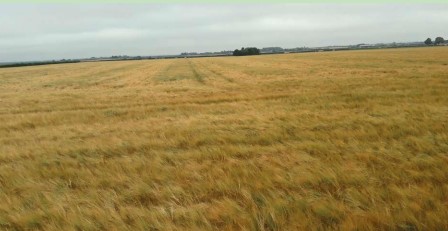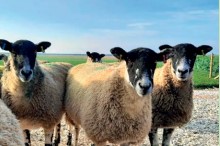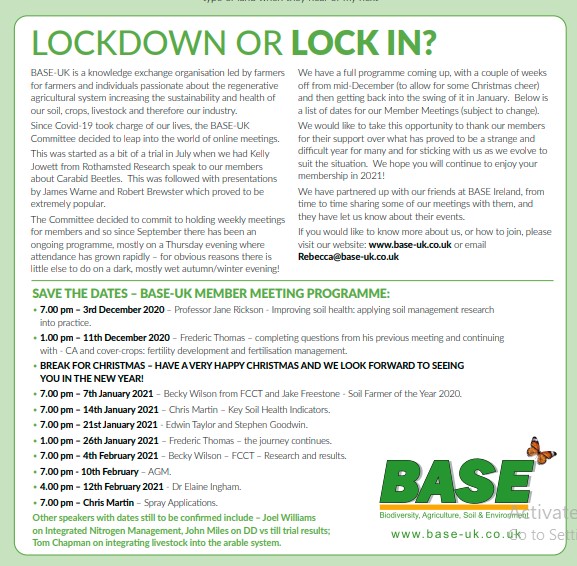James Warne from Soil First Farming defends urea and shows it may well be an easy scapegoat for the rise in
atmospheric ammonia levels
When I have something on my mind I tend to reach for a cup of tea and a biscuit. Those who have seen me will be able to verify this happens often. This is exactly where I had gravitated to one wet Saturday morning two years ago after paying another round of chemical and contracting bills and it was apparent there was going to be very little margin even if we did have a good year. I sat at the table and opened the country section of certain Yorkshire paper. There was the article penned by Angus Gowthorpe in which he spoke of his farming method “conservation agriculture” and his association to BASEUK. That article has led to a great many things for me.
I originated from a small livestock farm near York and have found myself on an Arable farm in East Yorkshire. I have no previous experience of Arable land management, cultivation or cropping. A recipe for disaster if there ever was one. Possibly it is a blessing as I have no preconception of how things should be done, and ignorance is bliss. The ethos of what Angus had written resonated with me, so I applied for my BASE membership and embarked on my voyage of discovery.
A few farm visits ensued to people who were practicing regenerative agriculture methods, and these were a real insight into what they were encountering. How the principle adopted translated into the practical. Mostly I loitered at the back hoping not to trip myself up by saying something stupid but absorbing as much information as possible. Everyone was very welcoming, and I felt confident to attend my first BASE AGM.
Two days of guest speakers. I will admit it was with some trepidation that I took my seat on the first morning not knowing anyone or what to expect. Those two days were like a light bulb moment! I learnt about soil, soil health, physical, chemical, and biological indicators. Financial costings, worm science and so much more. The whole event was recorded for members who could not attend to access later. I returned to the farm with enthusiasm. Previously the only time I might have got close to making holes in the ground or sniffing soil was if I had fallen off a horse. Now here I was with my shovel counting worms, really looking at the soil, what the structure was like, getting soil samples, doing filtration tests. I had begun to ask questions and look for the answers. The photograph above shows our first attempt at direct drilling…. Spring Malting Barley.

It was very clean all year although drilled nearly 3 weeks later than the more conventionally established only yielded slightly less. The lower chemical and cultivation cost made up for any yield deficit.
The first time I asked my contractor to put a molasses like substance through his expensive sprayer with the liquid fertiliser there was a raised eyebrow. To his credit he went along with it. I am not completely sure who was the most relieved when it all went without a hitch. I may not know a lot but have been incredibly blessed to have a fantastic agronomist and great contractors supporting me throughout. From the AGM I learnt about Groundswell and that is where I headed next. BASE has opened the door to a great many things. Recommended reading lists have provided a wealth of information, Farming Forum, Agroecology, and pod casts.
This year’s AGM was held at York pre pandemic. Speakers included Dr Sam Cook from Rothamsted Research, Dr Lea Harold from the PGRO, Edward Dickin on plant breeding, BASE-UK Member farmers, and scientists but for me Dr Anna Krzywoszynska was a standout. She spoke of “geosmin”; a chemical released from dead microbes in soil and how the human body can detect this smell in minuscule quantities, an evolutionary hangover that has the ability to lowers the heart rate – amazing! We need to trust our instinct. She spoke of the communities of practice, how we learn, seeking information, motivation, experimenting and how psychologically hard it is to make a change on your own. BASE has given me that community of support.
Especially welcome through the COVID-19 pandemic BASE has held webinar meetings, again, all recorded with BASIS and NRoSo points available. The quality of speakers throughout has been inspiring, diverse and educational. From mob grazing systems to the Lamport research trials to Fredric Thomas to name a few. BASE manages to cater for the novice like me to the very experienced.

The photograph above is of some of the expanding sheep flock as we start to get some livestock incorporated into the arable system.
The pandemic has highlighted how important conversation and a sense of belonging are. Normally I would play badminton, go swimming, attend a competition with the horse or head off to the livestock market and all that social interaction has gone or is seriously restricted. The Zoom meetings have been fab and best of all, if I look a bit of a mess, I can keep my camera off.
I have had many a night in the last two years laid awake worrying about if I could manage the task ahead of me. Was I making the right decisions? Will the cost of cover cropping be worth it? The intake of breath through gritted teeth from people who have farmed this type of land when they hear of my next step. It does really make you doubt if this moral path is right, after all “the road to hell is paved with good intentions” they say. No doubt there will be some failures along the way. From John Wooden the quote, “Failure is not fatal but failure to change might be”.
Male, female, young or old, the demographic is irrelevant. If you have an enquiring mind, then BASE-UK membership has something to offer you even if it is just to have a support network of likeminded people working towards a common goal to make agriculture more sustainable for future generations.
